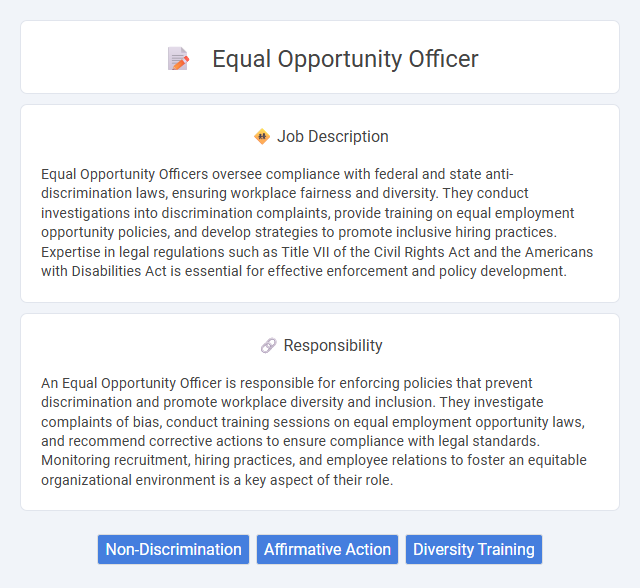
Equal Opportunity Officers oversee compliance with federal and state anti-discrimination laws, ensuring workplace fairness and diversity. They conduct investigations into discrimination complaints, provide training on equal employment opportunity policies, and develop strategies to promote inclusive hiring practices. Expertise in legal regulations such as Title VII of the Civil Rights Act and the Americans with Disabilities Act is essential for effective enforcement and policy development.
Individuals with strong interpersonal skills and a commitment to fairness are likely suitable for the Equal Opportunity Officer role. Those who thrive in environments requiring advocacy for diversity and resolving discrimination may find this position fitting. Candidates who prefer structured policy enforcement and possess resilience in handling sensitive issues could probably succeed in this job.
Qualification
Equal Opportunity Officers typically require a bachelor's degree in human resources, public administration, or a related field, with preference given to candidates holding certifications such as the Equal Employment Opportunity Specialist (EEOS) or Professional in Human Resources (PHR). Strong knowledge of EEO laws, regulations, and investigative procedures is essential, alongside experience in compliance monitoring, training delivery, and conflict resolution. Proficiency in data analysis and report writing further enhances the qualifications for effectively managing workplace discrimination and promoting diversity initiatives.
Responsibility
An Equal Opportunity Officer is responsible for enforcing policies that prevent discrimination and promote workplace diversity and inclusion. They investigate complaints of bias, conduct training sessions on equal employment opportunity laws, and recommend corrective actions to ensure compliance with legal standards. Monitoring recruitment, hiring practices, and employee relations to foster an equitable organizational environment is a key aspect of their role.
Benefit
The role of an Equal Opportunity Officer likely provides significant benefits such as fostering a diverse and inclusive workplace, which can enhance employee satisfaction and productivity. There is a strong probability that their efforts contribute to reducing discrimination and promoting fair treatment, potentially leading to improved organizational reputation. This position may also offer opportunities for professional growth through engagement with compliance and training initiatives.
Challenge
Equal Opportunity Officer roles likely involve navigating complex legal frameworks and addressing diverse workplace conflicts, which can present significant challenges. The necessity to balance organizational policies with individual rights may require strong problem-solving and communication skills. Managing sensitive issues while fostering an inclusive environment might demand ongoing adaptability and resilience.
Career Advancement
An Equal Opportunity Officer plays a critical role in promoting workplace diversity and ensuring compliance with anti-discrimination laws, which enhances organizational culture and employee satisfaction. Career advancement for this role often involves progressing to higher-level compliance or human resources management positions, leveraging expertise in legal frameworks and diversity initiatives. Developing strong analytical, communication, and policy development skills can accelerate promotion opportunities and broaden responsibilities in equal opportunity and inclusion strategies.
Key Terms
Non-Discrimination
An Equal Opportunity Officer enforces policies that prevent discrimination based on race, gender, age, disability, or religion in workplaces and educational institutions. This role involves investigating complaints, conducting training sessions on equality laws, and ensuring compliance with federal regulations such as Title VII of the Civil Rights Act. Expertise in non-discrimination laws is critical to promoting inclusive environments and safeguarding individuals' rights.
Affirmative Action
Equal Opportunity Officers develop, implement, and monitor Affirmative Action programs to ensure compliance with federal regulations such as Executive Order 11246 and the Civil Rights Act. They analyze workforce data, conduct training sessions, and collaborate with management to promote diversity, equity, and inclusion within the workplace. Expertise in legal requirements and reporting tools enables these officers to effectively reduce discrimination and foster equal employment opportunities.
Diversity Training
Equal Opportunity Officers design and implement Diversity Training programs to promote inclusive workplace environments and prevent discrimination. These professionals assess organizational policies and deliver customized training sessions that enhance cultural competence and awareness among employees. Their role ensures compliance with equal employment opportunity laws while fostering equitable practices across all levels of the organization.
 kuljobs.com
kuljobs.com